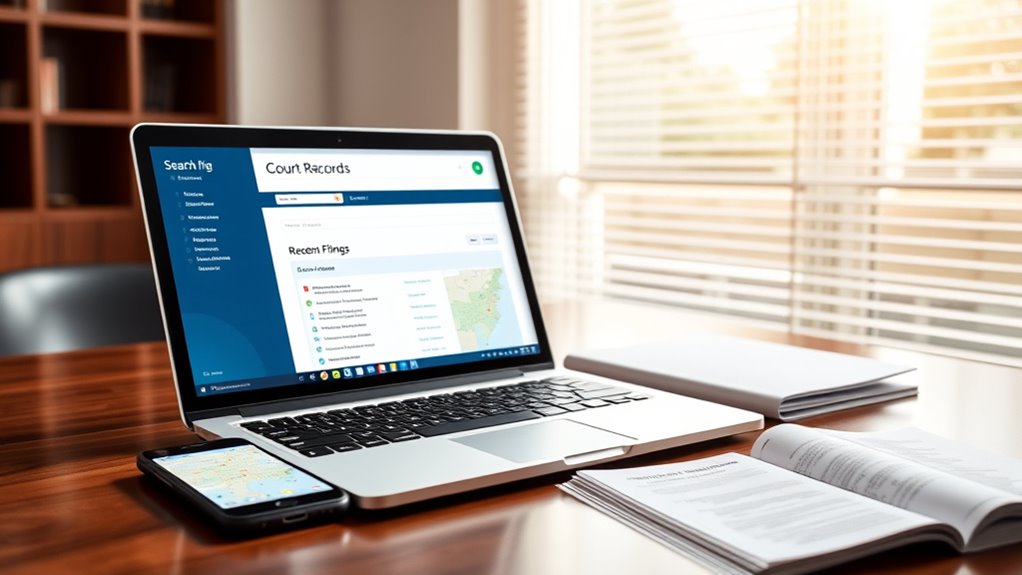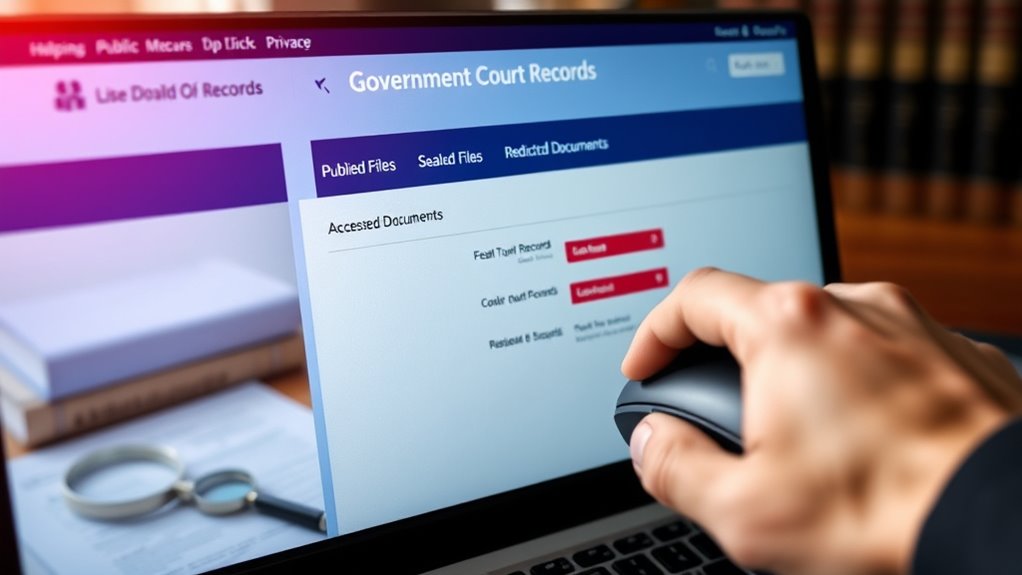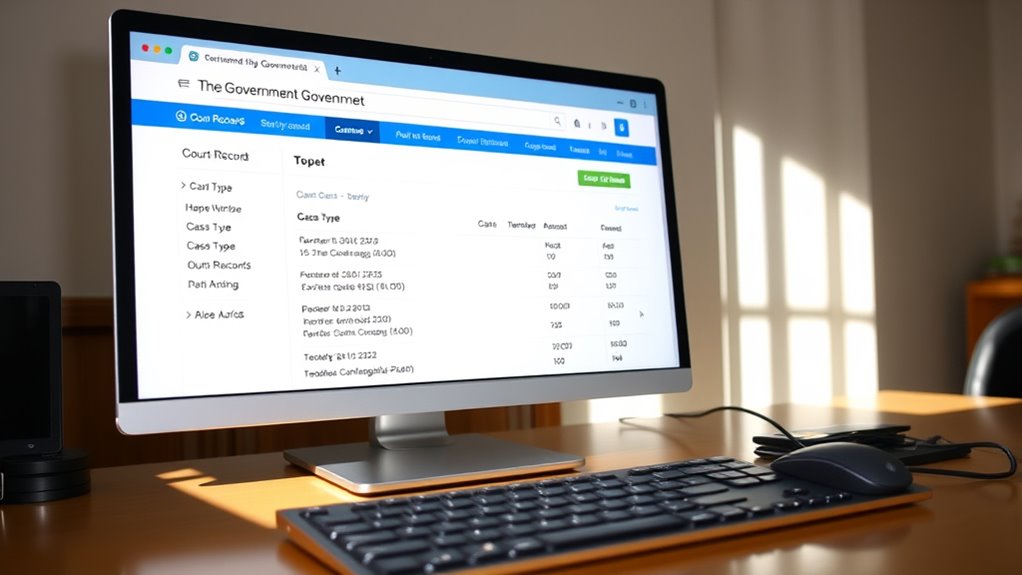To access public court records online, start by identifying the court jurisdiction—federal, state, or local—and use their official websites or portals. For federal cases, register on PACER to view dockets and documents; for state or local records, check their dedicated online systems or land record sites. Keep in mind that some documents may be sealed or redacted, requiring formal requests. If you keep exploring, you’ll discover how to navigate these systems effectively.
Key Takeaways
- Identify the relevant court jurisdiction (federal, state, or local) and locate their official online portals or systems.
- Register for online accounts on court websites or PACER to access detailed case information and documents.
- Use case numbers, party names, or docket details to search for records through available online search tools.
- Be aware that some records may be sealed, redacted, or restricted, requiring formal requests for access.
- Visit in person or use public access terminals at courthouses if online records are limited or unavailable.
Understanding Different Types of Court Records and Their Accessibility

Understanding different types of court records is essential because not all records are equally accessible or available online. You should know that many records are held by local Clerk’s Offices at the courthouse where the case was filed or heard. Some records are accessible in person or through public access terminals, while others are available remotely via online court systems. Additionally, online court systems often have varying levels of security and user interfaces, which can affect how easily you can find and interpret the information. Keep in mind, online access often provides only selected case elements, not the full files, to protect sensitive information. Certain documents may be sealed or redacted, limiting public access. Different courts and jurisdictions have their own platforms and policies, so you’ll need to adapt your approach depending on whether you’re searching state, local, or federal records. Familiarity with these distinctions helps you navigate the system effectively. Additionally, understanding the contrast ratio of a court record system can influence the clarity and usability of digital documents you access online, which is especially important given the digital accessibility challenges faced across various jurisdictions. Being aware of public access policies can also help you determine what types of records are available to the general public. Moreover, knowing about the security measures implemented in online systems can help you assess the reliability and confidentiality of the information you retrieve.
Navigating Federal Court Records With PACER

Federal court records are accessible online through PACER, the primary platform for obtaining court documents from the U.S. federal judiciary. To start, you’ll need to create a PACER account, which is quick and straightforward. Once registered, you can search for cases using case numbers, party names, or docket information across federal courts nationwide. PACER provides access to case summaries, dockets, and filed documents. Keep in mind, it charges $0.10 per page, so review your search results carefully. Some documents may be sealed or redacted, limiting access. To find specific cases, you can also use the PACER Case Locator if your initial search doesn’t yield results. Always verify details and contact the court clerk if you encounter inaccessible records. Understanding court record access can help you navigate the process more effectively.
Exploring State and Local Court Record Systems Online

Many states offer online portals to access court records, featuring case dockets, filings, and land records. However, access can be limited by policies on sealed or restricted documents, and some records still require in-person visits. Electronic filing systems often link with these portals, allowing you to view and submit documents digitally when available.
State Portal Features
Have you ever wondered how to access court records online at the state or local level? State portals are designed to make this process straightforward. They typically feature user-friendly search tools allowing you to look up cases by docket number, party name, or date range. These portals often include options to view case summaries, docket sheets, and some filings. Some platforms offer advanced filters to narrow results by case type or court location. Many states provide online access to land records, probate cases, and other public documents through dedicated portals. Secure login or registration may be required for detailed records or to file documents electronically. Overall, state portals centralize access, saving you time and helping you find the information you need efficiently. Additionally, understanding how public records systems work can further streamline your search process. Being aware of the privacy policies in place can help you navigate the scope of accessible information responsibly. Familiarizing yourself with the support hours and availability of assistance can also enhance your experience when using these online systems. Knowing the types of records available can help you identify which documents are accessible through the portal.
Access Limitations & Policies
While online access to state and local court records offers convenience, there are important limitations and policies you need to understand. Many records are restricted to protect privacy or security, with sealed or redacted documents preventing public viewing. Court rules determine which records are accessible, often requiring formal requests to view sealed files or obtain copies. Some jurisdictions limit online access to basic case information, such as docket entries or summaries, while full files remain offline or in person. Additionally, certain sensitive information, like social security numbers or criminal details, is automatically redacted. Be aware that each court or state may have different policies, and you might need to follow specific procedures or submit formal requests to access restricted or sealed records. Understanding court record restrictions is essential for navigating online searches effectively. It is also helpful to familiarize yourself with the specific online portals or systems used by courts in your jurisdiction to ensure proper access and compliance. Moreover, staying informed about state-specific privacy policies can help you better understand what information is publicly available and what remains confidential. For example, some jurisdictions may also restrict access based on user eligibility, requiring proof of legitimate interest. To improve your search efficiency, consider consulting access guidelines provided by each court system to adhere to their rules and avoid potential legal issues.
Electronic Filing Integration
Electronic filing systems are now seamlessly integrated with online court record platforms, allowing you to submit and access case documents electronically. This integration streamlines the process, making it easier to manage case information without visiting the courthouse. Many state and local courts offer e-filing portals connected directly to their record systems, enabling you to:
- Submit documents securely online, reducing delays and manual handling.
- Access real-time updates on case status and filings.
- View or download case documents, with some restrictions for sensitive information.
Additionally, some systems incorporate security protocols to protect your data during online submissions, ensuring confidentiality and integrity. These systems often require account registration and may include features like automated notifications when new documents are filed. Utilizing digital security measures is crucial to safeguard your sensitive information during online interactions. Implementing record management systems can further improve efficiency and organization in accessing court case data. For example, integrating case indexing can help users locate specific files more quickly. Moreover, these integrated systems can often accommodate document sharing capabilities, facilitating collaboration among authorized parties. E-filing integration simplifies case management, saves time, and improves access to court records for attorneys, litigants, or researchers.
Recognizing Privacy, Sealing, and Redaction in Court Documentation

Recognizing privacy, sealing, and redaction in court documentation is essential because courts actively protect sensitive information to safeguard individuals’ privacy and security. You should look for clues indicating that parts of a record are redacted or sealed, such as blanked-out sections, labels like “sealed,” or notices stating that certain documents are confidential. Courts seal records when they contain private details like social security numbers, medical information, or ongoing investigation data. Redaction involves removing or obscuring specific details before documents become public. When accessing court records online, understanding these protections helps you identify which documents are fully accessible and which are restricted. Additionally, being aware of court seal procedures can help you better interpret the accessibility and confidentiality of legal documents. Always respect privacy rules and follow procedures if you need access to sealed or redacted records for legitimate reasons. Recognizing the role of court seals and redactions can help you better interpret the accessibility and confidentiality of legal documents.
Step-by-Step Guide to Accessing Court Records Remotely

Accessing court records remotely is a straightforward process that allows you to obtain case information without visiting the courthouse in person. First, identify the court jurisdiction—federal, state, or local—and find the appropriate online portal or PACER for federal cases. Next, register for an account if needed, such as PACER, or use free court search tools available through state or local court websites. Then, search using case numbers, party names, or docket details. Review the available docket, filings, and documents, keeping in mind some records may be restricted or require special permission. If you can’t find what you’re looking for, contact the court’s Clerk’s Office for assistance or to request certified copies.
Access court records online easily by identifying the jurisdiction, registering, and searching case details through official portals.
- Select the correct court system and portal
- Register for an online account if necessary
- Search using case details or party names
Additional Resources and Tools for Finding Court Records

Beyond the primary online court record systems, several additional resources and tools can help you locate the information you need. For land or property records, websites like Maryland’s MdLandRec.net and Plats.net provide direct access to filed documents, simplifying real estate research. If you’re seeking criminal background checks, the Department of Public Safety & Correctional Services offers fingerprint-supported searches separate from court portals. Many courthouses also have public access terminals or kiosks, allowing you to search records in person without needing an internet connection. Educational programs and court tours deepen your understanding of the judicial process and how records are maintained. Additionally, help desks at clerk’s offices or PACER’s customer service can guide you through system navigation or answer specific questions. These resources streamline your search for court records beyond standard online portals.
Frequently Asked Questions
How Do I Access Sealed or Redacted Court Records Online?
You can’t access sealed or redacted court records online directly because courts restrict this information to protect privacy or security. To request access, you need to file a formal petition with the court explaining your reasons. The judge then reviews your request, and if approved, they may grant you access through a court order or special permissions. Always consult the court’s procedures for sealing and redaction before proceeding.
Are There Free Options to View Court Records Besides Paid Services Like PACER?
You can find free court records like hidden treasures, through state and local court websites. Many jurisdictions offer online case search portals, such as Maryland’s CaseSearch or DC Courts’ Cases Online, where you can look up dockets, filings, and land records without paying. Some courthouses also have public terminals for in-person searches. Remember, while some records are free, sensitive or sealed documents might still require formal requests or permissions.
Can I Access International or Foreign Court Records Online?
You can access some international or foreign court records online, but availability varies by country and court jurisdiction. Start by checking the official court or government websites of the country or region involved, as many nations provide online portals for public records. Some international cases may be available through global platforms or specialized legal databases. Be prepared for language barriers and restrictions, and always verify the credibility of the source before relying on the records.
What Are the Steps to Request Certified Copies of Court Documents?
Imagine holding a key to your past—requesting certified copies is your next step. First, identify the court that handled your case. Then, contact the clerk’s office either online, by phone, or in person. Provide your case details and pay any applicable fees. Finally, request the certified copies, which serve as official proof, giving you peace of mind and a tangible connection to your legal history.
How Long Do Court Records Remain Publicly Accessible Online?
Court records typically stay accessible online indefinitely, unless they’re sealed, redacted, or expunged. You can usually view these records whenever you need, but keep in mind that some documents might be restricted or removed if privacy or security concerns arise. If you encounter limited access or can’t find certain records, contact the court clerk’s office for assistance. Always check specific court policies, as rules vary by jurisdiction.
Conclusion
Now that you know how to access court records online, you’re ready to find the information you need efficiently. For example, imagine researching a property dispute and discovering important case details through PACER or local court websites. With these tools, you can uncover case histories, verify legal status, or gather evidence—all from the comfort of your home. Just follow the steps, stay aware of privacy considerations, and you’ll become a confident digital court record researcher.









